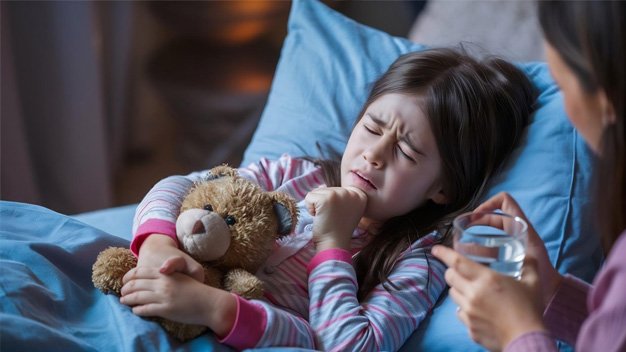
Fever in children is so common that parents have difficulty interpreting when they should worry or wait. Fever is a normal immune response to infection and a signal that the body is combating the illness. Here we are going to cover all the basics parents need to know about fever in children such as causes, symptoms, and treatment.
Understanding Fever in Children
A fever is defined as a temporary increase in body temperature, where your body is reacting to an illness. In Children, fever is generally accepted to be 100.4°F (38°C) and higher. Fever is often disconcerting, but fever can simply be a sign that your child is trying to stop the infection.
Common Causes of Fever in Children
There are a few things that could cause fever in children:
- Viruses: Most fevers in children are caused by a viral infection like a cold or flu.
- Bacteria: A fever can also be caused by bacterial infections such as strep throat, or an ear infection.
- Immunizations: Some immunizations can cause mild fever.
- Teething: Teething may or may not cause slight elevations in temperature; not all parents notice a raise in temperature when their child is teething.
When to Call the Pediatrician for Fever
Not every fever requires a trip to the doctor; however, there are several situations that should prompt a call to the pediatrician:
- High Fever in Baby: Any baby less than three months old, with a fever greater than or equal to 100.4°F (38°C), calls for a call to the pediatrician. This is crucial, because infants this age can be susceptible to serious infections.
- Fever For More than Three Days: If a child’s fever continues for more than three days, it’s time to consult a doctor.
- Fever Without Other Symptoms, or Unusual Behavior: Fever without any other symptoms and the child is not improving or showing unusual behavior, may require a trip to the doctor.
- Severe Symptoms: Severe headaches, stiff neck, trouble breathing, and very persistent vomiting are reasons to get help right away..
Recognizing Symptoms of Ear Infection in Child
Ear infections are a common cause of fever in children. Parents should pay attention to the below specified symptoms of ear infection in child, check it out:
- Ear pain or tugging at the ear
- Irritability or fussiness
- Trouble sleeping
- Fluid draining from the ear
- Fever, often mild to moderate
If you suspect an ear infection, call a pediatrician for evaluation and treatment.
Toddler Fever Treatment: Managing Fever at Home
Fever can be concerning, but it usually doesn’t need to be treated aggressively. Here are the best ways to deal with toddler fever treatment at home:
- Take the Temperature: Record your child’s temperature with a thermometer. It’s helpful to record the highest temperature and any associated symptoms.
- Hydration: Make sure you are giving your child plenty of fluids – water, an electrolyte solution, or clear broth; especially with fever, dehydration will happen!
- Comfort: Dress your child lightly and keep their room comfortable in temperature. Avoid over-bundling them, as this generally raises temperatures.
- Fever Reducer: Over-the-counter medication like acetaminophen or ibuprofen for children, can help reduce fever as directed. Make sure you follow the dosing instructions based on your child’s weight and age. Never give aspirin to a child, as acetylsalicylic acid has been associated with Reye’s syndrome (which is rare, but still serious).
When to Use Fever Reducers
Fever reducers can be useful, but they aren’t always needed. If your little one is content and can drink fluids, they may be best served to allow the fever to run its course. If they appear uncomfortable, lethargic, or in pain, a fever reducer for kids can relieve their symptoms when appropriate.
The Importance of Observation
As a parent it’s important to watch your child for changes in behaviour or additional symptoms. If your child has fever without other symptoms but is otherwise acting normally, it may be safe to monitor your child at home. If your child is continuing to get worse meaning their irritability is increasing, or they are showing signs of distress, then calling your pediatrician may be warranted.
Conclusion
Fever in children is a common phenomena, but understanding when to be concerned and when to just wait can make all the difference in how you care for your child. By knowing what signs to watch for, when to call pediatrician for fever, and how to address the syndrome with medication as needed, you will be able to handle this challenging time with confidence.
If you have any questions or concerns related to your child fever, or any other health conditions, do not hesitate to reach out to your health professional.
If your child has recurring or unexplained fevers, the Paediatrics Department at Deepasri Multispeciality Hospital can provide expert evaluation and care tailored to their needs.
Book an appointment now, and let us help your family stay healthy!
 Fever in children is so common that parents have difficulty interpreting when they should worry or wait. Fever is a normal immune response to infection and a signal that the body is combating the illness. Here we are going to cover all the basics parents need to know about fever in children such as causes, symptoms, and treatment.
Fever in children is so common that parents have difficulty interpreting when they should worry or wait. Fever is a normal immune response to infection and a signal that the body is combating the illness. Here we are going to cover all the basics parents need to know about fever in children such as causes, symptoms, and treatment.

